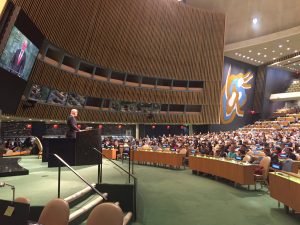Statement by H.E. Peter Thomson, President of the 71st Session of the General Assembly, at the Youth Assembly held at the United Nations
1 Feb 2017
Excellencies
Distinguished Guests,
Ladies and gentlemen,
It is my pleasure to welcome you to the United Nations for the 19th Session of the Youth Assembly.
I would like to thank the ‘Friendship Ambassadors Foundation’ and other programme partners for organizing this Assembly.
The theme of this Youth Assembly – Realizing the 2030 Agenda: Youth in Action – could not be more timely.
With young people across our world now numbering 1.8 billion, harnessing your voices, energy, ideas, and enthusiasm is central to our global efforts to implement the Sustainable Development Goals, and secure a sustainable future for humanity on this planet.
Taken together, the 2030 Agenda for Sustainable Development and the Paris Climate Change Agreement provide us with a universal masterplan to transform our world, to one in which extreme poverty is eliminated, the environment is protected, the rights of women and girls are secured, and people live in peaceful and inclusive societies.
Achieving this transformation requires bold, new thinking and collaborative approaches.
Today’s young people will live with the success or failure of our efforts to achieve the 2030 Agenda and the Paris Agreement. Today’s 10 year olds will be 23 in 2030. Therefore, they have the most at stake and therefore young people must be at the forefront of our efforts to implement the SDGs.
Young people must be empowered with the education, knowledge, skills and opportunity to participate as contributors, innovators and pacesetters in sustainable development efforts for the betterment of this world.
To support these efforts, last November, I wrote to all Heads of Government to urge them to include the SDGs in the education curricula of all schools, so that youth understands the logic of the 2030 Agenda, and so that all young people learn of the SDGs as both rights and responsibilities.
Ladies and gentlemen,
The central themes of your discussions over the next two days, including poverty, education, and sustainable consumption and production, are prime examples of the universal and integrated nature of SDGs, wherein progress on one goal drives progress across others.
In that spirit, I would like to make a few brief observations. Firstly – on poverty.
As the 2030 Agenda states, eradicating poverty in all its forms and dimensions, including extreme poverty, is the greatest global challenge and an indispensable requirement for sustainable development.
I am confident that eradication of poverty is within our reach to achieve by 2030.
Since 1990, the number of people living in poverty has reduced from 1.9 billion people to 702 million in 2015.
Despite this progress, 156 million youth currently live in extreme poverty, and 1 in 10 people live on less than USD$1.90 per day. So we still have much to do.
Most of these people are either young, poorly-educated, conflict-affected, from rural areas, or working in agriculture. Specific policies are needed to ensure sustainable development reaches these vulnerable populations, including by improving access to health, education, decent employment, and the other SDGs.
Secondly – education.
While over recent years the number of people living in poverty has declined, the number of young people out of school has risen over the same period.
It is hard to comprehend that in 2017, 263 million children and youth are currently out of school, with 24 million of them expected to never see the inside of a classroom.
Given that fundamental importance of education to sustainable development and driving inclusive economic growth, it is critical that we not only invest in education as a priority, but that we also remove the barriers that keep children and young people out of school. These barriers include building peaceful and inclusive societies, eradicating poverty, and empowering women and girls.
And finally – sustainable consumption and production.
Across our world, there are almost 800 million people who are going hungry. At the same time, 1.3 billion tons of food are being wasted every year.
I am sure you’d agree this is an immense failure in food distribution and a moral outrage.
Pursuing more responsible patterns of consumption and production will be an essential step in remedying this injustice, and will not only enable us to progress poverty and hunger eradication, but will also reduce waste and protect our natural environment and resources.
As President of the General Assembly, I am committed to driving a universal push for meaningful progress in implementing each of the 17 Sustainable Development Goals, and encourage you to join me in these efforts.
I leave each and every one of you today with a simple set of calls to action:
Be agents for change to drive innovative new approaches for the achievement of the SDGs.
Be voices that amplify the message of the SDGs around our world, through your personal, social media, and other interactions.
Be educators who share with others your knowledge of the central importance to humanity of the Sustainable Development Goals.
Be motivators and examples to your families, friends and communities on what sustainable living embodies.
Be consumers who reward socially and environmentally conscious companies. Don’t support unsustainable products.
And be active citizens calling for urgent and responsible action on sustainable development from those around you.
I wish you all a successful discussion today and I look forward to reading your Youth Plan of Action.
Thank you.


